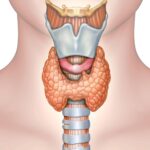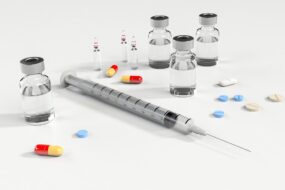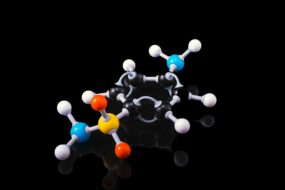Indomethacin is an indole acetic acid derivative and potent anti-inflammatory drug with prompt antipyretic action.
Indomethacin relieves only inflammatory or tissue injury-related pain.
In toxic doses, it uncouples oxidative phosphorylation.
The drug is well absorbed orally: rectal absorption is slow but dependable. It is partly metabolized in the liver to inactive products and excreted by the kidney. Plasma t½ is 2–5 hours.
Mechanism of action.
- It is a highly potent inhibitor of prostaglandin synthesis and suppresses neutrophil motility.
· Inhibits chemotaxis and alters lymphocyte activity.
· It decreases proinflammatory cytokine activity leading to anti-inflammatory activity.
Clinical uses.
- Mild to moderate acute pain.
- Inflammatory action in ankylosing spondylitis, acute exacerbations of destructive arthropathies, and psoriatic arthritis.
- Rheumatoid disorders.
- Acute gouty arthritis.
- Bursitis/Tendinitis
- Nephrogenic diabetes insipidus.
Adverse effects.
- Git: Gastric irritation, nausea, anorexia, gastric bleeding, and diarrhea.
- CNS: Frontal headache, dizziness, ataxia, mental confusion, hallucination, depression, and psychosis.
- Leukopenia, rashes, and other hypersensitivity reactions.
- Increased risk of bleeding due to decreased platelet aggregability.
Contraindication.
- In machinery operators, drivers, and psychiatric patients.
- People with epilepsy,
- Kidney disease
- Pregnant women and children.
Dosage.
- 25–50 mg BD-QID. Those not tolerating the drug orally may be given a nightly suppository.
- IDICIN, INDOCAP 25 mg capsule, 75 mg SR capsule, ARTICID 25, 50 mg capsule,
- INDOFLAM 25, 75 mg capsule, 1% eye drop.
- RECTICIN 50 mg suppository.












